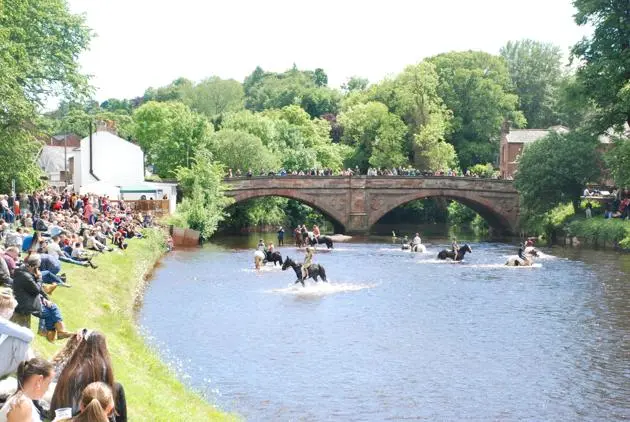
During the 2025 Appleby Horse Fair, Cumbria Police will be consulting with communities regarding their views on the use of emerging technology which could help police and partner agencies make future fairs safer for all.
Cumbria Police will be consulting with the Gypsy and Traveller community, the local settled population of Appleby and day visitors regarding the potential for Live Facial Recognition cameras to be deployed at future Appleby Horse Fairs.
Gold Police Commander for Appleby Horse Fair, Detective Superintendent Dan St Quintin of Cumbria Police, said: "Whilst we are not deploying Facial Recognition during the 2025 Appleby Horse Fair, I want to gauge public opinion on its potential future use.
"Therefore, we want to use the opportunity of the 2025 Fair to reach out to all communities impacted by the Fair to gauge opinion and feeling around the proposal.
"As Gold Commander for the Appleby Horse Fair policing operation it is my role to look each year at how we can enhance the safety of this event.
"This technology has the potential to have a profoundly positive impact on our ability to keep people safe - by quickly identifying people who are suspected of committing a crime, have travelled here despite being wanted by the police and by helping us to safeguard vulnerable people including missing individuals.
"However, policing by consent relies on public support for such measures, which is why we are asking for the public's views on our use of this technology in future Appleby Horse Fair policing operations."
People attending the event and those living locally will have the opportunity to take part in the survey.
There will be survey forms available to complete in writing at the Tourist Information Centre in Appleby.
Cumbria’s Police, Fire and Crime Commissioner, David Allen, said: “As Commissioner, I am the voice of the public in policing and fire services in the county so I’m really pleased to see Cumbria Constabulary consulting with the public on their thoughts surrounding facial recognition.
“Cumbria Constabulary prioritise keeping the public safe, deterring crime and dealing with criminality. Cumbria has an incredible track record of utilising technology to aid this and is already one of the leaders in CCTV use across policing in the UK.
“I genuinely believe that the use of facial recognition would be an excellent addition to the tools available for the Constabulary to use to keep our residents and visitors safe. However, it is important that we seek and give due regard to the public’s views and opinions on this matter.
“I want to make it clear: this isn’t a tool to spy on law-abiding members of the public.
“I would like to encourage anyone at the Fair and in Appleby to take part in the survey – we genuinely do want your opinions and for you to raise any concerns. Let us work together to ensure that we can continue to keep Cumbria and Appleby Fair safe for everyone.”
Gypsy and Traveller representative Billy Welch, a member of the Multi Agency Co-ordinating Group (MASCG), who work to make the Fair safer each year, said: "As the tenant of Fair Hill, I work with Police and the Council to keep Appleby Fair safe and enjoyable for everyone, for the sake of our children and grandchildren.
"Wherever people gather in large numbers, CCTV and security cameras have become normal, and the technology has advanced so fast that facial recognition is now a fact of life.
"If Cumbria police can use it to identify criminality and troublemakers and keep them away from the Fair, then I would support it.
"People who have not committed any offence have nothing to worry about. Some people might disagree, but whatever you think about this proposal, it is important that all points of view are heard, so I encourage everyone to take part in this survey so that Police can measure public opinion before the Fair next year."
What is Facial Recognition?
Facial recognition technology is an emerging technology used by law enforcement and by private companies within society.
The technology will assist policing both identify and locate individuals.
There are a number of ways policing has applied the technology. One way is Live Facial Recognition which involves cameras filming passers-by.
The technology then uses an algorithm that maps points on a person’s face and compares them to a database of images (watchlist) to assist the Operator in making an identification in real time.
Cumbria Police would use LFR for law enforcement purposes to identify persons wanted on warrant, suspected of crimes and identified as missing persons.
Data collected by LFR would be deleted immediately or within 24 hours for persons matched against the watchlist.
LFR would be used for overt policing activities
